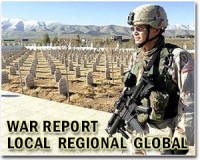| . |  |
. |
Jerusalem (AFP) Jan 16, 2011 Israeli Prime Minister Benjamin Netanyahu said on Sunday that regional political instability shows the Jewish state must seek ironclad security clauses in any peace treaty with the Palestinians. While not referring to any state by name, his comments at the start of the weekly cabinet meeting came after a popular revolt against Tunisian strongman Zine El Abidine Ben Ali and the collapse of the Lebanese government. "The region in which we live is an unstable region, everybody can see that today. We see it in several places in the broader Middle East," said Netanyahu. "There can be changes in governments that we do not foresee today but will take place tomorrow. "The lesson is that we have to stick to the principles of peace and security in any agreement that we make," said the Israeli premier. "We do not know if such an agreement will be honoured but we shall increase the chances of it being honoured if there are solid and serious security arrangements." Tunisian-born Israeli Deputy Prime Minister Silvan Shalom said there was a danger a political vacuum in Tunisia might be filled by radical Islam. "Today there is a great worry that Islamic movements which until now have been outside the law should not return," he told Israeli army radio. Others were more sanguine. "We are closely following the situation, but if there is a danger of a rising tide of Islamic elements we see no sign of it at the moment," an Israeli official told AFP on condition of anonymity. Following the overthrow of Ben Ali, there have been demonstrations of solidarity with the Tunisian protest movement, in the Palestinian territories, Jordan and Yemen, among other places. "The events in Tunisia encourage others who aspire to drive out dictators or overthrow authoritarian regimes," said the Israeli official. Speaking to reporters at the cabinet meeting on Sunday, Shalom said the events disproved the perception that all the Middle East's problems stem from the Israeli-Palestinian conflict. "What is happening in Tunisia is a domestic affair, what is happening in Lebanon is a domestic affair and what is happening in Sudan is a domestic affair, with no connection to the Israeli-Palestinian dispute," he told reporters. "This explodes the myth that this dispute is the root of all the instability in the Middle East," said Shalom. Shalom said he himself had been warmly welcomed to Tunisia. "I myself visited Tunis at the head of large delegation of ministers, members of parliament, journalists and business people and we were received very well," he said. "Israelis have visited there for years." The foreign ministry said about 20 Israeli tourists visiting Tunisia had been evacuated as a precaution. Israel and Tunisia established low-level diplomatic relations in 1994 but Tunis suspended ties in October 2000, with the outbreak of the Palestinian uprising against Israeli occupation. It is, however, still a popular destination for Israeli visitors, according to Claude Sitbon, an Israeli historian of Tunisia's Jewish community. "At least 8,000 Israelis go to Tunisia each year, and there are often officials among them," he said, adding about 1,700 Jews currently reside in Tunisia. He said Tunisia's Jews had enjoyed the protection of the deposed president, who had also appointed a Jewish member, Roger Bismuth, to the country's senate. About 55,000 Israeli Jews came originally from Tunisia.
Share This Article With Planet Earth
Related Links
 Military doctrine, now forgotten, critical to Gulf War
Military doctrine, now forgotten, critical to Gulf WarWashington (AFP) Jan 16, 2011 Twenty years after the brief but bloody Gulf War, the United States looks back on a campaign that averted a second Vietnam as it braces for another potential quagmire in Afghanistan. Operation Desert Storm, a 40-day war that pounded Saddam Hussein's forces out of Kuwait, was part of a military doctrine spelled out by the most senior military officer at the time - General Colin Powell - onl ... read more |
|
| The content herein, unless otherwise known to be public domain, are Copyright 1995-2010 - SpaceDaily. AFP and UPI Wire Stories are copyright Agence France-Presse and United Press International. ESA Portal Reports are copyright European Space Agency. All NASA sourced material is public domain. Additional copyrights may apply in whole or part to other bona fide parties. Advertising does not imply endorsement,agreement or approval of any opinions, statements or information provided by SpaceDaily on any Web page published or hosted by SpaceDaily. Privacy Statement |